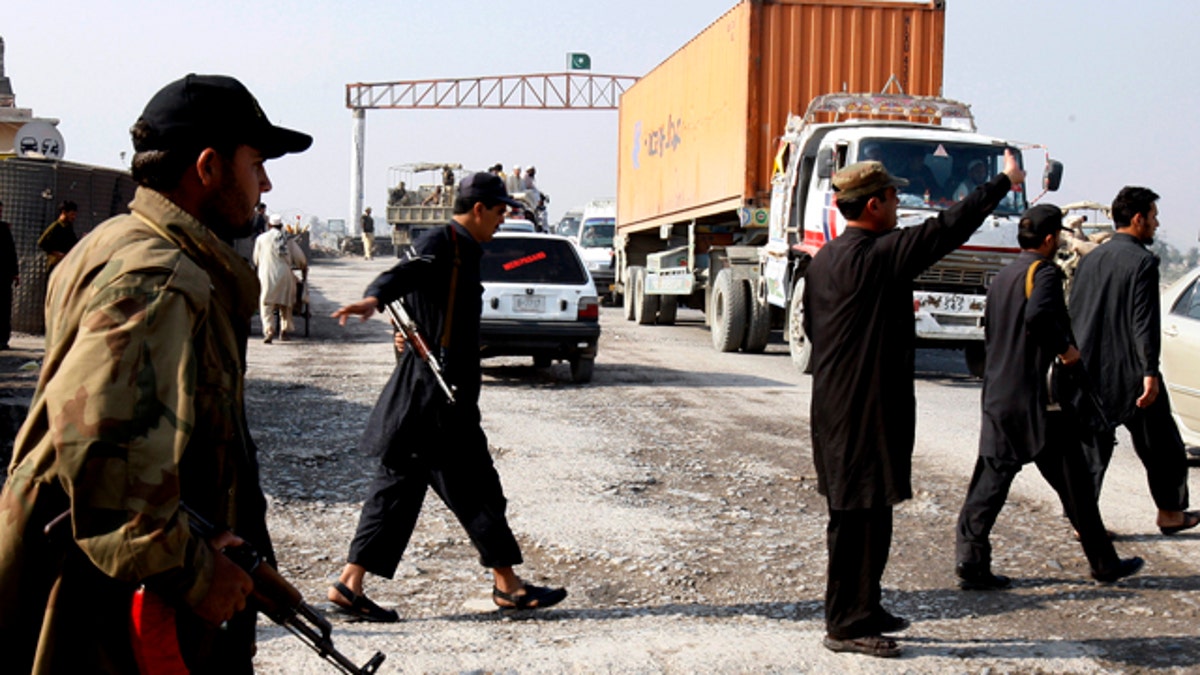
Nov. 26: Pakistani security personnel stop trucks carrying supplies for NATO forces in neighboring Afghanistan at Takhtabeg check post in Pakistan. (AP)
ISLAMABAD – Pakistan on Saturday accused NATO helicopters of firing on an army checkpoint in the northwest and killing 25 soldiers, then closed a key border crossing used by the coalition to supply its troops in neighboring Afghanistan.
The alleged Friday night attack was a major blow to already strained relations between Pakistan and U.S.-led forces fighting in Afghanistan.
In a statement sent to reporters, the Pakistan military blamed NATO for Friday's attack in the Mohmand tribal area, saying the helicopters "carried out unprovoked and indiscriminate firing."
The International Security Assistance Force says it is investigating the incident.
"This incident has my highest personal attention and my commitment to thoroughly investigate it to determine the facts," said General John R. Allen, commander of the International Security Assistance Force. "My most sincere and personal heartfelt condolences go out to the families and loved ones of any members of Pakistan Security Forces who may have been killed or injured."
The U.S. Ambassador to Pakistan Cameron Munter also promised to investigate the incident.
"I have seen press accounts of an incident on the Pakistani-Afghan border in which Pakistani soldiers were reportedly killed," Munter said in a statement. "I regret the loss of life of any Pakistani servicemen, and pledge that the United States will work closely with Pakistan to investigate this incident."
Pakistan state TV said the helicopters killed 25 Pakistani soldiers. Two government officials in Mohmand confirmed the death toll and said 14 other soldiers were wounded.
The helicopters attacked the checkpoint twice, and two officers were among the dead, said a government official in Mohmand and a security official in Peshawar, the main city in Pakistan's northwest.
The officials all spoke on condition of anonymity because they were not authorized to talk to the media.
The governor of Pakistan's northwest Khyber Pakhtunkhwa province criticized the incident, calling it "an attack on Pakistani sovereignty."
A Pakistani customs official told The Associated Press that he received verbal orders Saturday to stop all NATO supplies from crossing the border through Torkham in either direction. A transporter who runs a terminal at the border where NATO trucks park before they cross confirmed the closure. They spoke on condition of anonymity because of the sensitivity of the matter.
The incident came a little over a year after U.S. helicopters accidentally killed two Pakistani soldiers near the Afghan border, whom the pilots mistook for insurgents. Pakistan responded by closing the Torkham border crossing to NATO supplies -- as it did Saturday -- for 10 days until the U.S. apologized.
In a press release, the ISAF said its leadership remains committed to improving security relations with Pakistan, including coordination of operations along border regions in their united fight against terrorism.
Torkham runs through the famed Khyber Pass and is the main crossing to Afghanistan from Pakistan, the country through which NATO ships about 30 percent of the non-lethal supplies used by its Afghan-based forces.
The checkpoint that was attacked had been recently set up in Mohmand's Salala village by the army to stop Pakistani Taliban militants holed up in Afghanistan from crossing the border and staging attacks, said two local government administrators, Maqsood Hasan and Hamid Khan.
The military has blamed Pakistani Taliban militants and their allies for killing dozens of security forces in such cross-border attacks since the summer. Pakistan has criticized Afghan and foreign forces for not doing enough to stop the attacks, which it says have originated from the eastern Afghan provinces of Kunar and Nuristan. The U.S. has largely pulled out of these provinces, leaving the militants in effective control of many areas along the border.
The Afghan-Pakistan border is a constant flashpoint, with both nations and the U.S. exchanging accusations of violations and of negligence in preventing cross-border attacks. The border is disputed in many areas and not clearly marked, adding to the difficulty.
The U.S. and Afghan governments have long accused Pakistan of not doing enough to prevent its territory from being used by Afghan Taliban militants and their allies to stage attacks against forces in Afghanistan.
The Afghan government blamed Pakistan for firing hundreds of rockets into eastern Afghanistan earlier this year that killed dozens of people. The Pakistan army has denied it intentionally fired rockets into Afghanistan, but acknowledged that several rounds fired at militants conducting cross-border attacks may have landed over the border.
The Afghan and Pakistani Taliban are allies but have largely focused their attacks on opposite sides of the border. The Afghan Taliban aims to topple the U.S.-allied government in Kabul, and the Pakistani Taliban has tried to do the same in Islamabad.
Frustration about cross-border attacks in both directions has contributed to deteriorating ties between the U.S. and Pakistan. The relationship took an especially hard hit from the covert U.S. commando raid that killed Osama bin Laden in a Pakistani garrison town on May 2. The Pakistanis were outraged that they were not told about the operation beforehand, and now are angered even more than before by U.S. violations of the country's sovereignty.
The U.S. helicopter attack that killed two Pakistani soldiers on Sept. 30 of last year took place south of Mohmand in the Kurram tribal area. A joint U.S.-Pakistan investigation found that Pakistani soldiers fired at the two U.S. helicopters prior to the attack, a move the investigation team said was likely meant to notify the aircraft of their presence after they passed into Pakistani airspace several times.
Pakistan moved swiftly after the attack to close Torkham to NATO. Suspected militants took advantage of the impasse to launch attacks against stranded or rerouted trucks carrying NATO supplies.
Senior U.S. diplomatic and military officials eventually apologized for the attack, saying it could have been prevented with greater coordination between the U.S. and Pakistan. Pakistan responded by reopening the border crossing.
The Associated Press contributed to this report.
